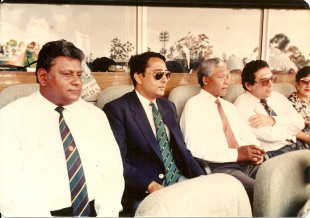You just couldn't say no
Ali Bacher

|
|||
|
Related Links
Players/Officials:
Ali Bacher
Teams:
South Africa
|
|||
South Africa were readmitted to the ICC in London in July 1991, and the World Cup was only seven months away - but there was no discussion about our playing in it. In August, I brought out the former West Indies captain Clive Lloyd to help promote cricket in the townships, and he was terrific. He wanted to meet Mr Mandela, so we went to Shell House - the ANC headquarters, in Johannesburg - where there was a huge contingent of Swedish media (the ANC had enjoyed the support of the Swedish government in the apartheid years).
The door was open, and I saw him for the first time. "Cricket chaps, come in," he said. We all went in, the Swedish media too. He complimented us on the development programme in the townships. Someone asked him: "What about South Africa playing in the World Cup?" He said: "They've got to play." That was it. Lobbying began within 24 hours, and we played in the World Cup. Simple as that. That was his muscle and influence.
He was an extraordinary person - in his capacity to forgive, not forget. When it came to the rugby World Cup in 1995, President Mandela went out publicly to support the springbok emblem - despite it recalling an era when South African international sport was whites-only. It was the main item on the news, and I was asked what I thought. I said: "Look, we have enormous respect for our president, but… we're not going to support it."
Next morning Madiba invited me to lunch, and for 40 minutes he explained to me and two of my board members in simple terms that he knew how important the springbok emblem was to the Afrikaner, and he wanted to thank them for supporting him as the first black president of our country. How can you argue with that?
When he walked on to the field at the final, the crowd was 99% white, mainly Afrikaners. And they were chanting "Nelson! Nelson!" Mind-boggling. But first he had gone into the changing-room wearing his Springbok jersey, which Steve Tshwete - who had been instrumental in South Africa's return to the ICC - had arranged for him that morning. Then he walked unannounced on to the field. There was no way our team weren't going to beat the All Blacks after that.
His touch with kings, prime ministers and the man in the street never changed. When we used to invite him to the cricket, the first thing he'd do was go to the catering area and shake hands with the staff. The administrators, white and black, were all lined up - but we had to wait. And when we introduced everyone in turn, he would use a stock phrase: "You might not remember me."
He phoned me just before South Africa co-hosted the cricket World Cup in February 2003. "Ali, I just want to wish your team every success." "Thank you very much, Mr Mandela."
"My name is Madiba, Ali." "Mr Mandela, where I come from, if you respect somebody enormously, you call him Mr."
In a second, he shot back: "Ali, where I come from, if you don't call me Madiba, you're not regarded as a true friend of mine." He had that common touch. In February 1993, I invited him and Walter Sisulu, who was high up in the ANC, to a triangular one-day competition between South Africa, Pakistan and West Indies. At tea, there was a request for him to come to the changing room and meet the teams - you can't believe the emotion when these chaps were shaking hands with him.
There were two ways back to the presidential room. Mr Mandela chose to go via the field, and a spectator about five yards away threw an orange at him, like a missile. It missed, and I caught it. Mr Mandela just carried on as though nothing had happened. Later, I asked his main security officer, "Did he see that?"
"Of course he did." "Why did he stay so calm?" "He wasn't going to show that person he was ruffled." He was the greatest fundraiser of all time. Whenever the phone went and it was Mr Mandela, the corporates would say: "I wonder what this call is going to cost me."
Once he said to me, "Ali, you would agree that I've helped you chaps get back into international cricket?" "Of course, Mr Mandela."
"Look, I've got this school in the Northern Province, and it's in terrible shape. I'm going to need a million Rand to upgrade it… I think it would be a nice gesture if cricket gave a million Rand."
I brought this up at the next board meeting, and someone complained that we weren't a charity organisation, that we were there to administer cricket. So I said, "Okay, if your answer's no, that's fine, but you're going to tell him, not me." So Ray White, the chairman, said, "All those who are opposed, put up their hand." Of course, nobody did. Can you imagine if the board had refused? It would have been around the country in a second. Nobody could say no. Rest in peace. Our beloved Madiba.

